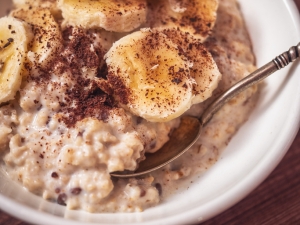As nutrition science and dietetics progress over time, the clearer it becomes there is no “one-size-fits-all” method for weight management. It makes perfect sense because everyone is unique in terms of genetics, personality, food environment, dietary habits, nutrition knowledge and cultural background!
Gut microbiota is another individual factor with important potential effect on food metabolism. The term gut microbiota (or gut flora) refers to the trillions of microorganisms that live in the human gastrointestinal tract. The largest microbe population is found in the colon. These microorganisms include bacteria, viruses, fungi and protozoa. A higher proportion of Firmicutes relative to Bacteroidetes bacteria has been recently linked to a significantly increased obesity risk.
Research on manipulating gut bacteria proportions through diet to promote weight loss is still ongoing with promising results! Consuming prebiotic foods (foods with ingredients that feed helpful gut bacteria) and probiotics (ingestible bacteria cultures with positive effects to gut health, mainly Lactobacillus and Bifidobacterium) could significantly change the gut flora synthesis in a positive way. Probiotics could reduce the levels of inflammatory molecules, which are in turn associated with impaired glucose and lipid metabolism. Many studies have shown that probiotic supplementation has positive effects on weight loss and abdominal fat reduction, although findings are not consistent. The research is ongoing!
However, it has been shown that the initial gut flora seems to affect the significance and duration of the results of any dietary manipulation. Just another evidence that each person is unique! More research, especially long-term human studies, is required to explore how we could use gut flora as a weight management tool!
So what have we learnt so far that could be practically useful for weight loss?

Apple oatmeal (1 small apple, 2 tbsp oats, 1 tsp coconut & ground cinnamon) and a small banana! A healthy breakfast full of soluble fibre.
1. Include more soluble fibre to your meals
In the UK the daily recommended dietary intake for fibre is 30g/day, but the majority of the population consumes less than 20 grams/day.
Soluble fibre dissolves in water to form a gel-like substance, which “traps” meal nutrients and delays their digestion and absorption. Good food sources of soluble fibre are carrots, mushrooms, pears, bananas, psyllium, beans, oats, citrus fruit, apples and barley.
Soluble fibre is a prebiotic because in the colon, it undergoes fermentation by gut bacteria to produce short chain fatty acids (SCFAs). SCFAs interact with receptors on the surfaces of intestinal enteroendocrine cells (L-cells) and stimulate them to produce GLP-1 and PYY peptides. Both peptides suppress the appetite and delay gastric emptying. This is why they help us to feel full for longer.
2. Avoid boiling / overcooking vegetables

Boiling vegetables (including starchy vegetables) can reduce the amount of fibre and starch that could reach the colon and be used for SCFA production by bacteria. Milling and other forms of industrial processing have similar effects. Processed and overcooked foods are more easily digested by gastrointestinal gut enzymes before fibre reaches the distal gut! That does not mean you should not cook your vegetables at all, since cooking makes useful nutrients easier to absorb!
Steaming asparagus tips can make their strong cell walls more permeable and the nutrients inside the cells more bioavailable! More soluble fibre molecules in mushrooms are likely to reach the distal gut intact by steaming comparing to boiling.
3. Reduce the consumption of fast food and ready-to-eat meals
If you are trying to lose weight, you probably already know that fast food, processed snacks and most pre- prepared meals are not the best options because of their high energy content. They are also low in fibre and useful vitamins and minerals and having them frequently has been associated with reduced gut flora diversity, lower SCFA production and a higher proportion of Firmicutes relative to Bacteroidetes bacteria. All these characteristics have been linked with having a higher body mass index!
4. Include foods with probiotics to your diet
 If you are not sure about probiotic supplements, there are healthy foods with probiotic bacteria to include to your diet plan!
If you are not sure about probiotic supplements, there are healthy foods with probiotic bacteria to include to your diet plan!
- Low fat Greek yogurt/ plain yogurt, without added sugar or artificial flavoring. Adding fresh fruit to yogurt for a healthy snack with soluble fibre and probiotics, excellent for your gut health.
- Kefir is a product of product of milk fermentation. Overnight oats soaked in kefir can make a delicious gut-friendly breakfast!
- Foods made from fermented soybeans: tembeh, natto, miso
- Foods made from fermented cabbage: Sauerkraut, kimchi
5. Exercise
Moderate to vigorous aerobic exercise has been shown to increase SCFA production for lean and obese adults. It could also promote gut flora diversity in a positive way and in increase the proportion of Bacteroidetes relative to Firmicutes bacteria combined with a balance diet.
To sum up, maintaining a diverse gut flora (while following your diet plan!) could help you with losing weight but more research is needed. If you consider taking probiotics or any other supplements, please consult with a registered dietitian or another healthcare professional. Every person is different and finding what works for you is the key to successful weight management!
You can learn more about Maria Tikka at her website geekynutritionist.com
References
Allen, J. M., Mailing, L. J., Niemiro, G. M., Moore, R., Cook, M. D., White, B. A., Holscher, H. D., & Woods, J. A. (2018). Exercise Alters Gut Microbiota Composition and Function in Lean and Obese Humans. Medicine and science in sports and exercise, 50(4), 747–757. https://doi.org/10.1249/MSS.0000000000001495
Aoun, A., Darwish, F., & Hamod, N. (2020). The Influence of the Gut Microbiome on Obesity in Adults and the Role of Probiotics, Prebiotics, and Synbiotics for Weight Loss. Preventive nutrition and food science, 25(2), 113–123. https://doi.org/10.3746/pnf.2020.25.2.113
Dagbasi, A., Lett, A., Murphy, K., & Frost, G. (2020). Understanding the interplay between food structure, intestinal bacterial fermentation and appetite control. Proceedings of the Nutrition Society, 1-17. doi:10.1017/S0029665120006941
Monda, V., Villano, I., Messina, A., Valenzano, A., Esposito, T., Moscatelli, F., … Messina, G. (2017). Exercise Modifies the Gut Microbiota with Positive Health Effects. Oxidative Medicine and Cellular Longevity. https://doi.org/10.1155/2017/3831972
National Institutes of Health- Office of Dietary Supplements (2020). Probiotics Fact Sheet for Health Professionals. Retrieved from: https://ods.od.nih.gov/factsheets/Probiotics-HealthProfessional/
Wang, Z. B., Xin, S. S., Ding, L. N., Ding, W. Y., Hou, Y. L., Liu, C. Q., & Zhang, X. D. (2019). The Potential Role of Probiotics in Controlling Overweight/Obesity and Associated Metabolic Parameters in Adults: A Systematic Review and Meta-Analysis. Evidence-based complementary and alternative medicine : eCAM, 2019, 3862971. https://doi.org/10.1155/2019/3862971
About Maria Tikka



Leave a Comment: